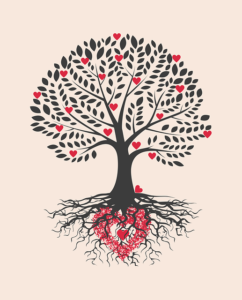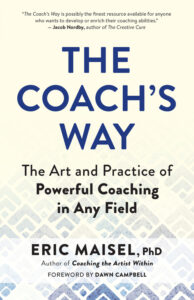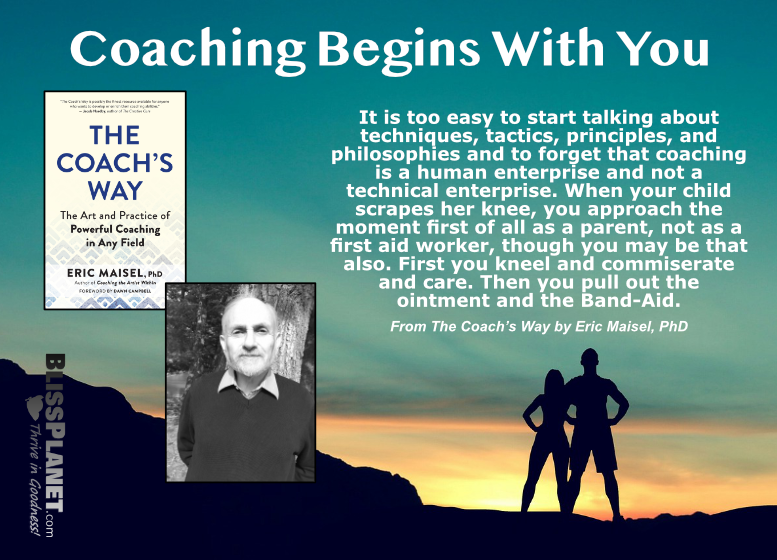An Excerpt from The Coach’s Way by Eric Maisel, PhD
You are somebody, not everybody and not nobody.
The way this is customarily said is that you have a “personality.” Maybe you are more introverted or more extroverted, more confident or less confident, more wounded by past experiences or less wounded, more of a worrier or more of a doer. Whatever the exact details, you are you, a particular member of a certain species with a certain genetic history, certain experiences, certain attitudes, certain proclivities, all coming together as the thing we call “personality.”
You and I haven’t traveled the same path. I am a retired family therapist and active coach; you may have a teaching credential, a certificate as a yoga trainer, or experiences as a shaman. You and I do not have the same genetic code, the same wiring, the same cellular memories, the same style of indwelling. You may love something I hate, and I may love something you hate. Isn’t that obviously true? But as obvious as that is, we need to say it out loud, remember it, and honor it.
You are not me. You are you. It’s been said (I think I remember it from the cop show Blue Bloods) that each of us has three lives: a public life, a private life, and a secret life. I’ve written about personality as being comprised of three parts: original personality, formed personality, and available personality. There are more ways than you can shake a stick at to conceptualize and describe “personality.” The simple headline? When you sit across from a client in a coaching session, you will be there, in all your richness, strangeness, brightness, and shadowiness. You will have brought your personality with you.
Coaching begins with you. That is unavoidable.
What does this mean? Why am I bringing this up first? Because it is too easy to start talking about techniques, tactics, principles, and philosophies and to forget that coaching is a human enterprise and not a technical enterprise. When your child scrapes her knee, you approach the moment first of all as a parent, not as a first aid worker, though you may be that also. First you kneel and commiserate and care. Then you pull out the ointment and the Band-Aid.
“Mastering the coaching session” has a technical ring to it, as in, “First you do this, and then you do that.” And there are certainly tactics and techniques to consider. But the picture you want to have in mind is of two people sitting across from each other, in person or remotely, both very human, both very complicated, both with needs, both ready to dive in, and both ready to bolt. This is not a person, the client, sitting across from a robot, the coach. Maybe that is coming … but right now coaching is still an encounter between two people, each with a history and a personality.
Accept that you will be there. Not some expert version of you, though you will gain expertise over time, but the current you, the constant you, the you that your Aunt Maisie would recognize as you, the you who prefers peach pie to apple pie and has trouble sleeping. Accept this reality, because there is no other. Yes, over time you may discern how to adopt a useful persona, a coaching persona. But who will have discerned that and adapted that to his or her needs and specifications? You.
EXCERCISES
Easy. Visualize yourself sitting across from another person, preparing to be of help. See you, not some facsimile of you. What are you wearing? How does your hair look? There you are!
Easy. Say, “I can’t avoid bringing me to the coaching session. Given that I can’t avoid it, I accept — and embrace — that reality.”
Medium. Accept that you, warts and all, opinions and all, prejudices and all, doubts and all, will be coming to the coaching session. Is there some ceremony to enact or some visualization to create that will help you accept that reality?
High bar. How can you bring the best of you to each session and avoid bringing the worst of you to each session? Give this question some thought.
Food for Thought for Informal Coaches
Do you do much informal coaching? Maybe you do, but hadn’t really thought of it as coaching. Think of those times when you patiently tried to be of a little help to another person, maybe just by listening or maybe by offering suggestions. Do some such situations come to mind?
Writing Prompt for Self-Coaches
It is often easier to coach others than to coach ourselves, because when it comes to coaching ourselves, our own personality can get in the way. Write to the prompt “In order to coach myself, I am going to have to look out for …”

Eric Maisel, PhD, is the author of The Coach’s Way: The Art and Practice of Powerful Coaching in Any Field, as well as more than fifty other books in the areas of critical psychology, writing, and creative life. A retired family therapist, he is now an active master coach who blogs for Psychology Today, The Good Men Project, Thrive Global, and Fine Art America. His “Rethinking Mental Health” blog for Psychology Today has over 3 million views, and he is the creator of and lead editor for the Ethics International Press Critical Psychology and Critical Psychiatry series. He lives in the San Francisco Bay Area. EricMaisel.com.
 Excerpted from the book The Coach’s Way: The Art and Practice of Powerful Coaching in Any Field ©2023 by Eric Maisel, PhD. Printed with permission from New World Library — www.newworldlibrary.com.
Excerpted from the book The Coach’s Way: The Art and Practice of Powerful Coaching in Any Field ©2023 by Eric Maisel, PhD. Printed with permission from New World Library — www.newworldlibrary.com.






We encourage YOU to take advance of the opportunity here at Bliss Planet to utilize the Wellness Course here at Bliss Planet that is free to access all the materials and through our foundation provide all with scholarships to become a Certified Wellness Specialist. Access your Wellness Course Materials here:
https://blissplanet.com/wellness-certification